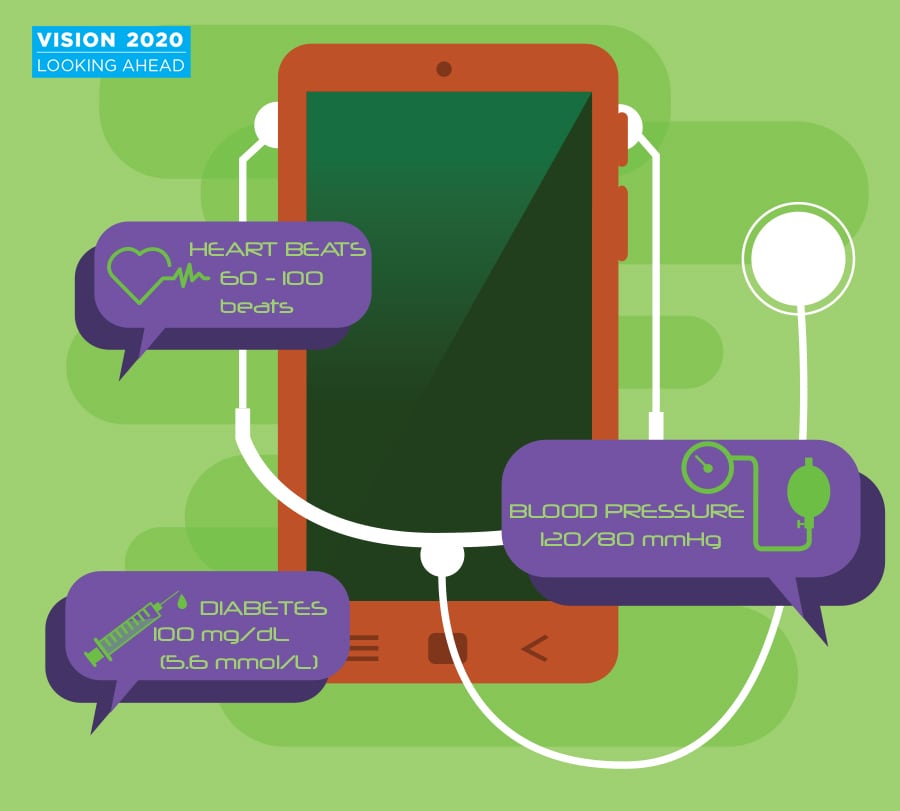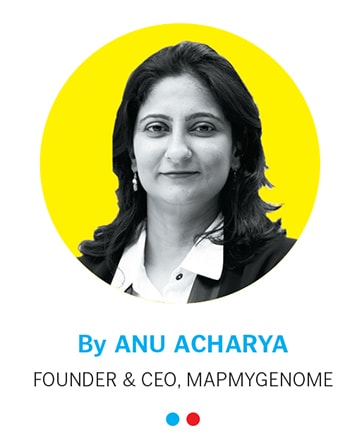'Health screening will happen in real time': Anu Acharya
The founder and CEO of MapMyGenome says that in India's consumer-centric health care market, technologies that save on costs will be adopted faster


 Illustration: Chaitanya Dinesh SurpurI am a big believer that if we can dream it, we can build it. Over the past few years, health care has become interesting not just for the startups that have built solutions from the pain they have felt individually but we are seeing major investments from large companies from outside the health care domain, like the Googles, Amazons and Apples of the world. This is a sign that health care will most decidedly change drastically.
Illustration: Chaitanya Dinesh SurpurI am a big believer that if we can dream it, we can build it. Over the past few years, health care has become interesting not just for the startups that have built solutions from the pain they have felt individually but we are seeing major investments from large companies from outside the health care domain, like the Googles, Amazons and Apples of the world. This is a sign that health care will most decidedly change drastically. In India, these changes are more likely to happen since it is more of a consumer-centric market than the developed world, with 62 percent of the costs being borne by consumers themselves. It implies that when consumers save on health care costs, they are likely to adopt those technologies sooner. India also has challenges like fewer hospitals in rural areas and the need for monitoring from remote areas.
In India, these changes are more likely to happen since it is more of a consumer-centric market than the developed world, with 62 percent of the costs being borne by consumers themselves. It implies that when consumers save on health care costs, they are likely to adopt those technologies sooner. India also has challenges like fewer hospitals in rural areas and the need for monitoring from remote areas.
While health care innovators are coming up with fascinating new products and discoveries like CRISPR and more, the areas in which we are likely to see the most changes are:
1. Screening: Personal genomics can play an important role in screening for complex and rare diseases in India. The data generated by mapping genomes can be used for devising better nutrition plans and insurance cover. It would be ideal to screen every citizen as costs would come down furthermore, and since it is easy to collect saliva samples in rural areas and store them cheaply with new technologies in DNA storage.
2. Point of care diagnostics: Local companies venturing out to build portable machines for various applications in diagnostics for applications in breast cancer, haemoglobin and other screening tests are likely to finally succeed in putting multiples tests together and potentially integrate them with other consumer products. The samples used are likely to evolve from blood, saliva and urine to voice, breath and smell. They will also become much more real time, from the earlier samples that were collected in the hospitals and now at home, towards transmitting data through mobile phones or other wearable gadgets continuously.
3. Education: As technologies change faster than traditional education and regulation, there is a need for better visual and learning-based education for the medical and health care field. Education will be more gamified and with a lot more virtual and augmented reality.
4. Artificial intelligence (AI): While AI is a buzz word, it is also integrated into many areas of health care. This could be in education, devices, data and much more. We have already seen its use in decoding images and text this is likely to expand to diagnostics and monitoring data that we are likely to generate. We will surely see AI become much more integral over the next decade, obliterating the need for making it a separate bullet point soon.
5. Implants: Neuroprosthetics is an example but there are several more that are impacting the lives of millions and will continue to do so. Other examples would include RFID chips under the skin that can keep track of our electronic health records (EHRs), and biosensors that would monitor blood and other parameters.
"Education needs a revolution in the 2020s": Byju Raveendran
6. Home health care: Such services include collection of test samples and delivery of results at one’s doorstep and providing of actual medical care and physiotherapy at home, avoiding the inconvenience of having to go to a hospital and wait in crowded waiting rooms.
7. EHRs over the next decade: One can expect that the generation, storage and analyses of patient health records will significantly move online. This will also allow for the application of AI techniques at various stages—from diagnostics to treatment.
8. Internet of Things (IoT): Next-generation apps will be integrated into household devices like refrigerators and bathroom seats. Reminders and screening of health can be done in real time.
9. E-pharmacies and payments: E-pharmacies of the future would evolve from the current models of being a marketplace. They would allow consumers to connect their IoT devices to ensure that drugs would not only need a prescription but also check for drug-drug interaction, genomic drug profile information. Doctors would be able to send their prescription over voice-enabled devices.
10. Regulations: These will have to become robust in how hospitals deal with patient data. New regulations will also have to be written as new areas of medicine come up, built around the use of the knowledge of individuals’ genetic makeup.
"The patient today is much more empowered": Ameera Shah
11. Robotics: This will likely play a bigger role in surgery, making it more precise and less painful and perhaps even bring down the time it takes for a patient to recover from the surgery. Robots will be more prevalent and their usage will move to older patients’ homes and hospitals.
12. Personalised medicine: This will be a reality and much more common than it is today. A decade after Angelina Jolie wrote the op-ed in The New York Times about her double mastectomy, we will find such preventive surgeries and other preventive techniques becoming much more acceptable in society.
13. Participation: Consumers are more likely to participate in their own health and will do so not just by accessing more information about their health, but also with data that is sent through monitoring devices.
14. Mental health: It will become mainstream as consumers start to accept it as a reality. It is likely to move beyond consulting doctors, from doing occasional tests to regular monitoring and devices that can signal issues.
15. Early detection techniques: This would include contact lenses that can check for early signs of cancer or manage diabetes or clothing that can sense health issues using nanotechnology. The current liquid biopsies will become a lot more sophisticated and precise. Today we have access to our sleep using a wearable but we are likely to see remote sensors that can recognise individuals and sense their sleep, movements and more.
As we move towards a more personalised approach to health care using technology, we are likely to evoke feelings of angst around privacy and data. While millennials are more likely to accept it as a generic feature of being human, health care will need to bring in more of the elements of care and human touch and this need not come from brick-and-mortar hospitals or medical doctors we will have more professionals trained to have conversations, like trained genetic counsellors or nutrition counsellors.
As the quest to enhance and increase our lifespans continues with innovations in health care, my hope is that we continue to bring in more human creativity and evolve mankind as a whole.
First Published: Jan 14, 2020, 16:17
Subscribe Now